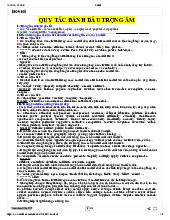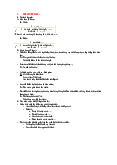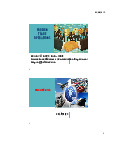


Preview text:
VÕ PHƯƠNG UYÊN_39_22DH123320
WRITING 3- CH6- CAUSE/EFFECT ESSAY HOMEWORK 1/ Do TRY IT OUT on page 124
Block Organization Outline: I. Introduction Hook
Background information on Internet addiction: Thesis statement: II. Body pharagraph
Psychological factors contributing to Internet addiction
Escapism and avoidance of real-life problems
Self-esteem and identity issues
Coping mechanism for stress and anxiety III. Conclusion Recap of main points
Implications of understanding psychological causes of Internet addiction Closing thoughts
Chain Organization Outline: I. Introduction Hook
Background information on Internet addiction Thesis statement II. Body pharagraph
Isolation and loneliness as psychological causes of Internet addiction
Explanation of isolation and loneliness
Effects of isolation and loneliness on mental health
Connection between isolation/loneliness and Internet addiction
Self-esteem and identity issues as psychological causes of Internet addiction
Explanation of self-esteem and identity issues
Impact of low self-esteem and identity crisis on individuals
Relationship between self-esteem/identity issues and Internet addiction
Coping mechanism for stress and anxiety as psychological causes of Internet addiction
Overview of stress and anxiety
How stress and anxiety lead to Internet addiction
Coping strategies and their influence on Internet addiction III. Conclusion Recap of main points
Importance of understanding psychological causes of Internet addiction Closing thoughts
2/ Do WRITING ASSIGNMENT on page 130
Internet addiction has become a growing concern in today's digital age. Many individuals
find themselves unable to disconnect from the online world, leading to detrimental effects
on their mental health and overall well-being. This essay will explore the psychological
causes of internet addiction, focusing on three key factors: escapism and avoidance of
real-life problems, self-esteem and identity issues, and the use of the internet as a coping
mechanism for stress and anxiety.
One of the primary psychological causes of internet addiction is the desire to escape from
real-life problems. Life can be challenging, and individuals may find solace in the virtual
world of the internet. Whether it's academic or work-related stress, relationship
difficulties, or personal struggles, the internet offers an opportunity to escape from these
problems temporarily. Engaging in online activities provides a sense of detachment from
reality, allowing individuals to forget about their troubles and immerse themselves in a different world.
In addition to escapism, self-esteem and identity issues contribute significantly to internet
addiction. The online realm provides a platform for individuals to create a new identity or
enhance their existing one. Through social media platforms and online communities,
people can carefully curate their online persona, seeking validation and acceptance from
others. This quest for affirmation and a sense of belonging can become addictive, as
individuals rely on the internet to boost their self-esteem and find a sense of purpose and identity.
Furthermore, the internet serves as a coping mechanism for stress and anxiety. In today's
fast-paced society, individuals experience high levels of stress and anxiety, seeking relief
in various ways. For some, the internet becomes a refuge, offering a temporary escape
from the pressures of everyday life. Engaging in online activities provides a distraction
and a source of entertainment, temporarily alleviating stress and anxiety. The constant
availability of online content provides a quick fix and a momentary sense of calm,
creating a cycle of reliance on the internet as a coping mechanism.
In conclusion, the psychological causes of internet addiction are multifaceted and
complex. Escapism and avoidance of real-life problems, self-esteem and identity issues,
and the use of the internet as a coping mechanism for stress and anxiety all contribute to
the development of this addictive behavior. Recognizing these underlying psychological
factors is crucial in addressing and effectively treating internet addiction. It is essential to
promote healthy coping mechanisms, improve self-esteem, and encourage individuals to
face real-life challenges rather than seeking refuge in the virtual world. By understanding
the psychological causes, we can work towards a balanced and healthy relationship with the internet.




